“Cordial consent” directed against Germany and Russia
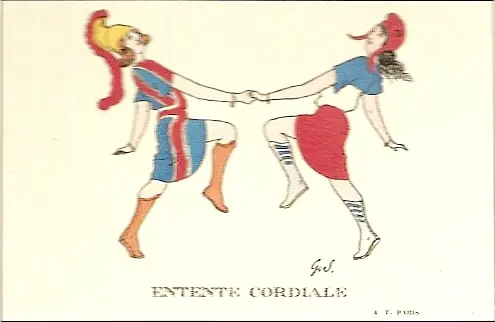
A French postcard depicting the dance of Marianne and Britannia, symbolizing the newborn cooperation between the two countries.
Strategic situation at the beginning of 1904
By the beginning of 1904, Britain and the United States carried out an excellent strategic operation - they pitted Russia and Japan against each other (Why did Japan attack Russia). At the same time, they armed Japan to the teeth, helped it create a first-class fleet, and financed the war.
American President Theodore Roosevelt was very pleased that Japan attacked Russia. American big business was very concerned about the successes of the Russians in the Far East and China. Roosevelt most flatteringly characterized Japan as a “good guard dog.”
At the same time, London and Washington chose the most opportune moment to start the war.
Firstly, Russia had no allies. Japan's alliance with England guaranteed the localization of the war. Almost all European powers were, to one degree or another, interested in this war and Russia's failure. Only Germany demonstrated friendly neutrality. England and the USA financed Japan.
Secondly, the war started before the Siberian Railway and the Chinese Eastern Railway reached full capacity. Russia needed time to transfer troops from the European part of the empire to the Far East. Also, measures to strengthen the defense of the Russian Far East, Zheltorossiya (Manchuria), Port Arthur, strengthening the Pacific fleet.
Thirdly, Russia’s enemies have well calculated that the decisive factor in the Far Eastern theater will be the fleet factor. Superiority at sea decided the outcome of the start of the campaign. The overall forces of the Russian fleet had an overwhelming superiority over the Japanese fleet: 20 battleships against 7. But in the Pacific Ocean, Japan was stronger than Russia. The Russian fleet was divided between the Baltic, Black Sea and Pacific Ocean.
Within the Pacific Ocean itself, the Russian squadron was divided between the Yellow and Japanese Seas. Russia did not have time to transfer the main forces of the armored fleet from Europe to the Pacific Ocean before the start of the war. Japan could gather all its strength into a fist.
Fourthly, Russia’s external opponents, with the help of a fifth column, were preparing a revolution.
Thus, the war with Japan was supposed to become a detonator for the collapse of Russia. But the first attempt failed to destroy the Russian Empire. The war in the Far East was a weak irritant for society, and the tsar still had strong support - a professional army, ready to demolish neighborhoods in Moscow or St. Petersburg on orders, and the “deep people” (Black Hundreds), dissatisfied with the rampant chaos.
Russia survived, the revolution was crushed. The West began preparing a new scenario: a suicidal confrontation between the German and Slavic worlds.
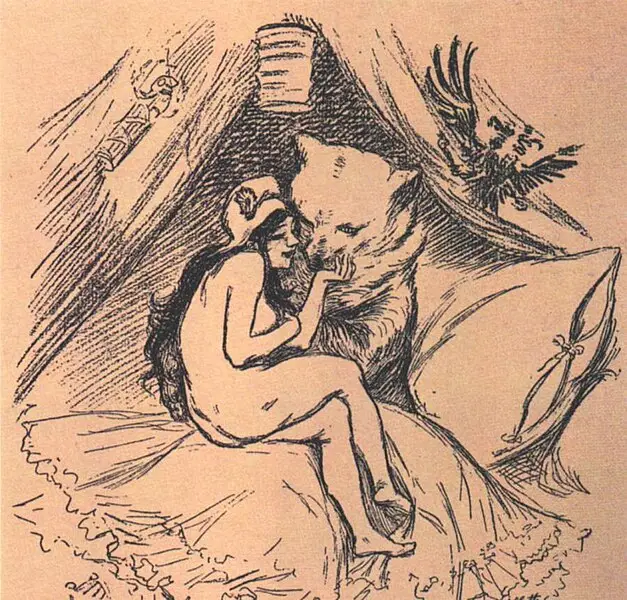
French cartoon from 1893 regarding the Franco-Russian Union. Marianne (France) asks the bear (Russia): “Tell me, dear, I will give you my heart, but will I get your fur coat in winter?”
French interests
In Paris they looked at St. Petersburg's enthusiasm for Far Eastern affairs with apprehension.
On the one hand, French capital used Russia's successes to penetrate China.
On the other hand, the French were afraid that while Russia was busy in the Far East, Germany would strengthen its position in Europe. France needed the Russian army to contain the dangerous aspirations of the German Empire. Therefore, from the end of the 1891th century, the French ruling circles looked with discontent and fear at how the ally (1892–XNUMX the Franco-Russian Alliance and the Military Convention was formalized) was drawn deeper and deeper into the problems of the Far East.
The French government is taking precautions. Paris is taking steps towards rapprochement with Italy and England. The initiator and leading figure of this policy was the Minister of Foreign Affairs Théophile Delcasse (Minister of Foreign Affairs of France in 1898–1905, 1914–1915). His main collaborators in the matter of rapprochement with England and Italy were the French ambassadors in these countries: in London - Paul Gambon, in Rome - Barrer.
In France, active supporters of rapprochement with England were the radicals in power (Combe, Clemenceau) and right-wing socialists (Jaurès). The coming to power of the radical party helped to bring the country closer to Britain. Previously, opponents of rapprochement with England were representatives of the “colonial party” - France had many controversial issues with Britain in Africa and Asia. However, now colonial circles, due to the strengthening of the German threat, changed their position.
French industrial and financial capital planned to extend its sphere of influence to Morocco. The French's competitors in this matter were the colonialists of Spain, England and Germany. If another European power strengthened in Morocco, then France would not only lose the wealth of this country. Moreover, it was a matter of strategic security - the ability to maintain dominance in Tunisia and Algeria was deteriorating. Therefore, the French had to come to an agreement with England.
In August 1902, the French ambassador informed the British Foreign Secretary, Lord Lansdowne, of France's desire to act in harmony with England. There was no real rivalry between England and France, according to Delcasse. The two great powers were not competitors in the world market like Germany or the United States. The French and British only need to agree on Morocco and Siam. Jointly take care not to let the Germans into your sphere of influence.
For France, with the beginning of the Russo-Japanese War, the issue of rapprochement with England became especially acute. The Russians were completely connected in the Far East. In Europe, France was left alone with Germany. I had to forget the grievances against England regarding the “fight in Africa”.
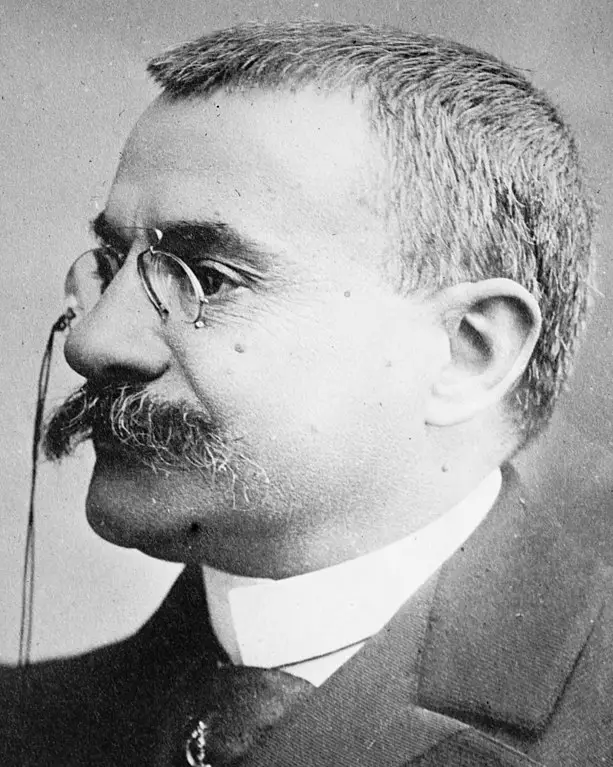
French Foreign Minister (1898–1905, 1914–1915) Théophile Delcasse (1852–1923)
Rapprochement with Italy
At the same time, the French were able to achieve rapprochement with Italy, which was part of the Triple Alliance (a military-political bloc of Germany, Austria-Hungary and Italy, formed in 1882). France, which had a more powerful economy and finances, waged a customs and financial war against Italy from the second half of the 1880s to force it to leave the Triple Alliance.
Italy suffered great losses (except for its capitalist oligarchs) and could not stand it. Its ruling circles moved towards rapprochement with France. In 1896–1898 financial and economic problems and defeat in Abyssinia forced Rome to make reconciliation with France. In 1896, the Italians recognized the French protectorate over Tunisia. Two years later, France signed a trade treaty that ended the customs war.
The crisis of capitalism in 1900 increased Italy's need for money. Germany did not provide assistance. French capital took advantage of the moment. French loans saved Italy from financial collapse. In addition, Austria-Hungary interfered with Italian attempts to expand its sphere of influence at the expense of the Ottoman Empire. Delcasse immediately proposed to Rome an agreement on the division of North Africa. The French recognized Italy’s “rights” to Tripolitania (formally belonged to Turkey), and the Italians agreed with France’s seizure of Morocco. In December 1900, a corresponding agreement was concluded.
On November 1, 1902, an agreement was concluded in Rome between the French Ambassador to Italy, Camille Barrère, and the Italian Minister of Foreign Affairs, Giulio Prinetti. France and Italy pledged to remain neutral if one of the parties to the agreement entered the war, which effectively negated Italy's real participation in the Triple Alliance.
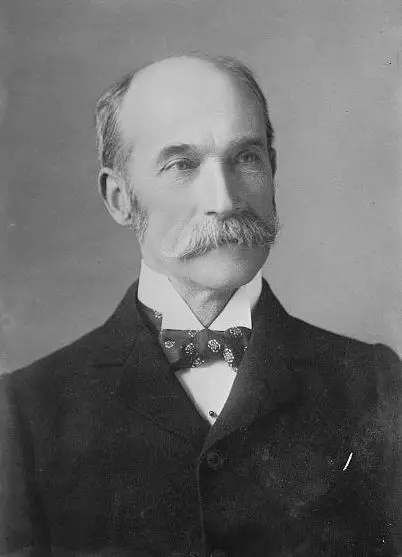
British statesman Henry Petty-Fitzmaurice, 5th Marquess of Lansdowne (1845–1927). Throughout his political career, he served as Governor General of Canada (1883–1888), Viceroy of India (1888–1894), Secretary of War (1895–1900) and Foreign Secretary of Great Britain (1900–1905), and also headed the Liberal Unionist faction parties in the House of Lords. One of the architects of the Anglo-French "Agreement of the Heart".
British interests
Meanwhile, Britain was looking for allies against a rising Germany. The British were afraid of the young German Empire, which was squeezing Britain out in the world market, wanted to redistribute the colonies in its favor, and was rapidly building up its fleet. Most of all, the British were worried about the German fleet, which threatened England’s dominance on the seas, its communications and, accordingly, the colonial empire, which ensured the prosperity of the British metropolis.
In 1902, the British, with the help of Japan, secured their position in the Pacific Ocean (a blow to Russia, further enslavement of China) and solved their problems in South Africa (the Anglo-Boer War). Now London had to take care of its main competitor - Germany. This was preparation for the battle for the place of “king of the hill” in the Western global order.
If earlier England and Germany cooperated on a number of issues, now everything was different. Thus, London is reconsidering its position regarding the Baghdad railway. Negotiations were held between the Deutsche Bank and British bankers at the beginning of 1903 regarding participation in the construction and use of British capital.
The Germans had difficulty financing the road, so British participation was desirable. But the German authorities wanted to maintain priority for German capital. The British wanted to get into operation the last section of the road, which adjoined the coast of the Persian Gulf, and did not want to allow Germany to have a privileged position.
In April 1903, the British abandoned participation in this project. The British press began to promote the idea that the Baghdad Railway would pave the way for the German army to the southern seas and India. The British began to obstruct the construction of this strategic highway. Following the British, in the fall of 1903, France also refused to participate in this project.
Thus, a struggle begins between Britain and Germany for a new world order, for leadership in the Western project and civilization. Naturally, the British needed “cannon fodder” on the continent. "Battering rams" that will destroy the German world.
The French and Russians were signed up for the war with the Germans. Just as at the end of the 18th – beginning of the 19th century, against France, which under Napoleon Bonaparte began to claim a dominant role in Europe and the world, the British used the German world (Austria and Prussia) and Russia.
It was easier to negotiate with France than with Russia. The French were afraid of the Germans after the pogrom of 1870–1871, subsequent military alarms, and longed for revenge. In addition, by supporting Japan against Russia, the British alienated Russia. The Russo-Japanese War delayed the development of Anglo-Russian negotiations.
On the other hand, with the help of the Japanese, Russia was expelled from the Far East and returned to Europe.
The English Conservative Party, which had once sought the support of the German world against Russia, now acted as the leader of the anti-German course. Most liberals were in solidarity with conservatives. The British press begins a fierce information war against Germany.
A staunch supporter of rapprochement with France and Russia as opposed to Germany was the British King Edward VII. The king saw the main enemy of the British Empire in Germany, plus a personal enmity towards the German Kaiser Wilhelm II. British aristocratic and banking houses looked with fear and hatred at the successes of the German Empire in the fields of trade, economics and shipbuilding. Young Germany was crowding out decrepit Britain. As a result, Edward played a prominent role in reconciling England with old rivals and developing an anti-German course. Behind the king were the aces of the financial oligarchy of the British City.
The agreement with France was supported by Aveling Baring, the de facto ruler of Egypt and a representative of the largest banking house, the Barings. The head of this house, Lord Revelstoke, was part of King Edward's close circle.
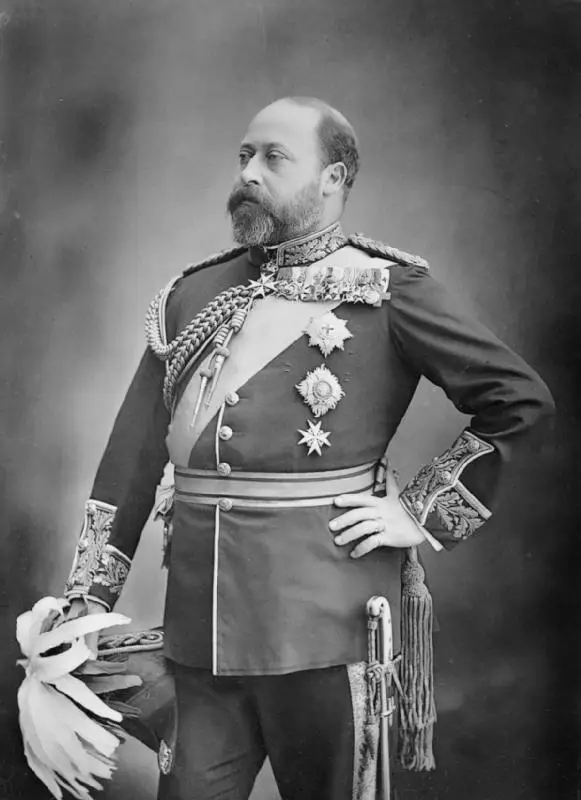
Portrait of the Prince of Wales, later King Edward VII, in full dress uniform, 1889.
"Dividing Africa"
In the spring of 1903, the British King Edward VII arrived in Paris. The visit demonstrated Anglo-French rapprochement. In Paris, the king said that the time of old enmity was a thing of the past, that the era of Anglo-French friendship was coming. In the summer, the President of the French Republic, Emile Loubet, and Delcasse visited the British king.
Negotiations began at the level of foreign ministers. The first priority was to resolve colonial differences. To the questions raised by the French about Morocco and Siam, the British added Egypt. The Anglo-French treaty took the form of an agreement on the division of the colonies. Therefore, Social Democrat V. Lenin described this deal briefly and clearly: “They are dividing Africa.”
The agreement was signed on April 8, 1904. The agreement had two parts: public and secret. A joint declaration on Egypt and Morocco, according to which France recognized the rights of England to Egypt, and England the rights of France to most of Morocco. At the same time, the secret part provided for the possibility of changing the “political status” of Egypt and Morocco and the transition of part of Morocco near the Strait of Gibraltar to the sphere of influence of Spain.
A separate declaration established the division of Siam between England and France along the Menam River (now Chao Phraya). The western part of the country, bordering Burma, passed into the sphere of influence of England, the eastern part, adjacent to Indochina, came under the influence of France.
Several other controversial colonial issues of lesser importance were also settled. In essence, Britain and France divided up the last “free” territories.
Thus, the creation of the Entente eliminated the long-standing Anglo-French colonial rivalry. England and France were preparing to jointly oppose Germany.
Britain had the opportunity to strengthen the defense of the mother country. The Admiralty brought about 160 ships to the British Isles, which were scattered throughout the empire's possessions (mostly from the Mediterranean Sea). Now communications in the Mediterranean could be provided by the allied French fleet. England could concentrate the main forces of the fleet against Germany.
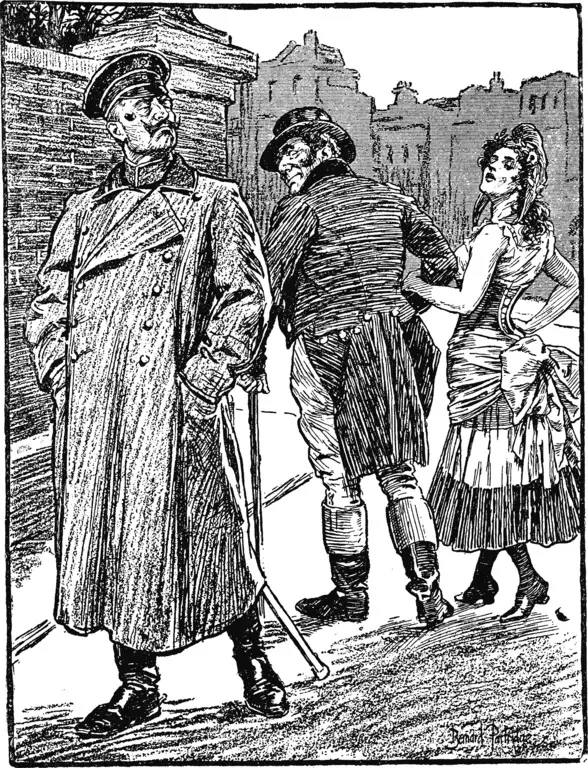
Caricature by Bernard Partridge from Punch 1906. John Bull (lit. “John Bull” is a nickname, a collective humorous image of a typical Englishman, one of the images of Great Britain) leaves with the street girl Marianne (a nickname for France since the time of the French Revolution), turning his back to Germany. The tip of the sheath of a cavalry saber, protruding from under the overcoat, implies a potential readiness to fight back.
Information